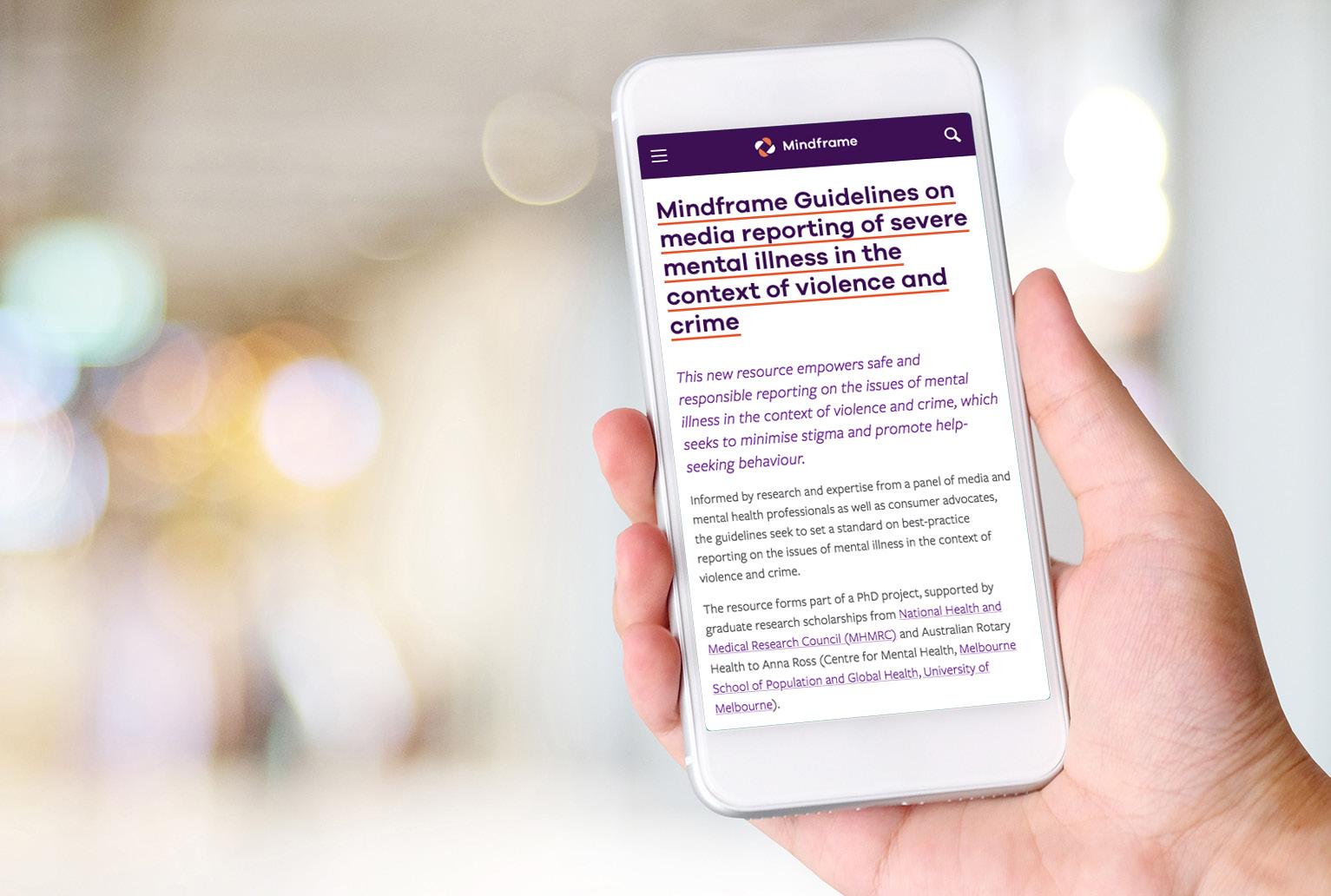
4 minute read
Key terms to understand when reporting on crime and mental illness
from Guidelines on media reporting of severe mental illness in the context of violence and crime
by Everymind
Consider the impact of news reports on mental illness and crime
Consider the impact of the story on people with a mental illness, including anyone you know personally. You should be aware that inaccurate, unbalanced and sensationalist reporting of mental illness can have negative implications for others with mental illness or their families (e.g. increased discrimination against them, reduced professional help-seeking and lowered self-esteem).
Reporting a diagnostic label of a person who has committed a crime can have negative implications for others with the same diagnosis or their families (e.g. increased discrimination against them, reduced professional help-seeking and lowered self-esteem). Negative reports can lead to cumulative damage on attitudes and behaviours towards people with mental illness.
Negative reports about health services might discourage help-seeking. While such reports may be in public interest, it’s important to be accurate and precise about issues so as not to give a negative perception of all services.
Report accurately
To ensure accuracy when reporting about mental illness in the context of crime, avoid:
Assuming the cause of crime or violence is mental illness.
Implying that everyone with a mental illness is violent, or is a risk to the public.
Excusing antisocial behaviour by high-profile people (e.g. sports stars) on the basis of mental illness (e.g. depression) unless this has been verified by an authoritative source (e.g. court records, police reports and mental health professionals rather than their publicist).
Attributing a mental illness to someone purely because their actions are shocking or seem inexplicable.
Asking for an ‘on air’ diagnosis from mental health experts.
Assuming that behaviours and emotional reactions that are common to many people are symptoms of mental illness (e.g. mood changes, lack of or excessive emotional reactions, inappropriate laughter or crying).
Making generalisations about people with mental illness on the basis of their diagnosis (e.g. anyone with schizophrenia would be unable to work).
Speculating about the person featured in a story having a mental illness.
Portraying mental illness as a hopeless situation, something someone ‘suffers’ with forever, and cannot recover from (e.g. suggesting future employment and family life are not possible).
When reporting on mental illness and crime:
Rely on authoritative sources (e.g. court records, police reports, mental health professionals) when reporting on a person’s mental health status.
Exercise caution in reusing information about a person’s mental health from original reporting done in the immediate aftermath of an event.
Ensure that in telling one person’s story that the report doesn’t suggest that everyone will have the same experience of mental illness.
In cases where a diagnosis of mental illness has been verified by an authoritative source:
Do not assume that everything the person does or the emotions they display are the result of their illness.
Only report on a person’s mental illness in criminal proceedings where it is relevant.
If mental illness has been verified as playing a role in the person’s behaviour, report the diagnosis in the context of discussing other factors that may also have contributed to the behaviour, such as drug and alcohol misuse.
Provide relevant context
When reporting on mental illness and crime (and allowed by law):
Avoid presenting mental illness as the sole cause of a violent incident.
If relevant, explain factors that may have contributed to the incident (e.g. substance use, distressing hallucinations, a lack of treatment or treatment that may not have been effective).
Avoid attributing mental illness-related violence to any single cause, or a simple biological cause.
Seek accurate background information about mental illness from mental health professionals to provide context.
Before reporting statistics on crime and mental illness, understand the source of information, the type of analysis done and its limitations. Try to interview professionals about what can be done to prevent similar incidents occurring again in the future (e.g. access to mental health services, police responses to mental illnesses).
When reporting on verdicts of ‘not guilty by mental impairment’:
Explain the implications of the verdict, such as that the person will receive a supervision order or will be securely detained.
Where mental illness is raised as a mitigating circumstance in a crime (e.g. ‘the person is depressed’), it should be reported as a claim rather than an established fact, unless this has been supported by an authoritative source.
Use appropriate language
Recommendations for using appropriate language that are outlined in the Mindframe guidelines for reporting on suicide and mental Illness also apply to reporting on mental illness in the context of crime and violence. Some of these principles are highlighted below as a reminder, as well as some additional recommendations for reporting in this context.
Avoid using language that:
Sensationalises mental illness, such as ‘mental patient’, ‘nutter’, ‘lunatic’, ‘crazed’, ‘unhinged’, ‘psycho’, ‘schizo’, ‘wacko’, ‘deranged’ or ‘mad’.
Labels or defines a person by their diagnosis, such as a person is ‘a schizophrenic’, ‘psychotic’ or ‘bipolar’.
Confuses the experience of emotions with having a mental illness (e.g. someone who is angry is not ‘psychotic’).
Uses colloquialisms to refer to treatment, such as ‘happy pills’, ‘shrinks’ or ‘mental institutions’.
Instead use:
‘Person-first’ language (e.g. ‘person with schizophrenia’ rather than ‘schizophrenic’, ‘living with bipolar disorder’ rather than ‘bipolar’).
Terminology to describe mental health services that implies they are not similar to prisons (e.g. saying ‘discharged’ rather than ‘released’, ‘left’ rather than ‘escaped’, ‘admitted’ rather than ‘committed’ or ‘confined’).
Accurate terms to describe types of mental illness (e.g. ‘psychopathic’ versus ‘psychotic’).





